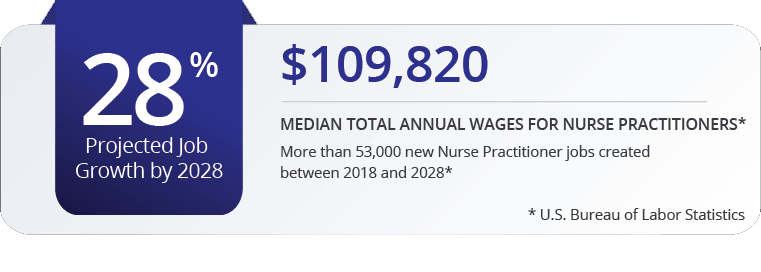Online MSN to Doctor of Nursing Practice (Post-Master’s) Program
Effect Meaningful Change as a DNP-Equipped Nurse Leader
Become a nurse leader and a change agent equipped with knowledge, skills and abilities to negotiate the complex and rapidly evolving health care environment.
Marymount’s online post-master’s Doctor of Nursing Practice (MSN to DNP) is designed for the working nurse who possesses a master’s degree in nursing and desires to acquire the practice-focused skills and knowledge needed to influence health care policy and lead interprofessional teams to improve quality amongst individuals and populations with a Doctor of Nursing Practice.
Why a Doctor of Nursing Practice?
In 2004, the AACN membership endorsed a position stating the DNP is the most appropriate degree for advanced-practice registered nurses (APRNs) to enter practice. Today, the American Association of Colleges of Nursing (AACN) and other authorities are calling for a rapid increase in the number of nurses holding doctoral degrees to meet the nation’s demand for faculty, researchers, advanced clinicians and leaders. And the latest recommendation from the National Organization of Nurse Practitioner Faculties (NONPF) is to make the DNP degree the standard, entry-level degree for nurse practitioners.
Compared to the Master of Science in Nursing (MSN) degree, the DNP allows you to play a larger role in patient care, leadership and quality improvement. As the highest level of education available in the nursing field, the DNP is the ideal option for nurses who aspire to leadership roles.
Convenient, Online Format for Working Professionals
All courses are taught online with virtual lectures, small cohorts and no on-campus experience with this program, to accommodate the schedules of working professional nurses. You will advance in your career path by earning your clinical doctorate to transform healthcare in the following ways:
- Advocate for change in healthcare policy
- Evaluate quality outcomes at the individual and population levels
- Lead teams, systems and practices with confidence
- Apply theories of professional leadership, personal leadership, skill building, quality improvement and ethical values
“I would absolutely recommend Marymount University to someone considering a nursing degree. The personal attention you receive is unmatched.”
– Angeline Thomas
Make a Difference with a Doctor of Nursing Practice Degree
At Marymount, nurse professionals are taught to provide compassionate primary care using evidence-informed practice and ethical analysis. Mentored by seasoned nurses based near the nation’s capital, you will deepen your knowledge of the global scope of healthcare policy and systems to effectively make an impact. Marymount’s MSN to DNP degree prepares nursing professionals to assume leadership roles in the health care system and develop new models of care delivery using a holistic approach. The DNP program is focused on:
- Evidence-informed practice
- Health care policy
- Leadership
- Epidemiology
- Ethics
Marymount fully supports you in your commitment to earning a post-master’s DNP with student support and more as you move through coursework, residency, a doctoral project and independent study.
Program Outcomes
The post-master’s MSN to DNP online curriculum features 11 courses. Throughout the program, you will:
- Develop new approaches to advanced nursing practice and health care delivery
- Demonstrate clinical, organizational, and systems-level leadership
- Design methods for evaluating clinical outcomes to direct evidence-based practice for improving health care outcomes
- Utilize knowledge drawn from epidemiological, statistical, and technological data to improve quality
- Lead interprofessional teams in the analysis of complex practice and organizational issues
- Demonstrate leadership in health policy advocacy
- Demonstrate advanced levels of clinical judgment, systems thinking, and accountability
- Apply ethical analysis when generating policy, research, and practice
- Use conceptual and analytical skills in evaluating the links among practice, organizational, population, fiscal, and policy issues.
Program Features

Admission Requirements

Program Curriculum Snapshot

Frequently Asked Questions

Student Testimonials










